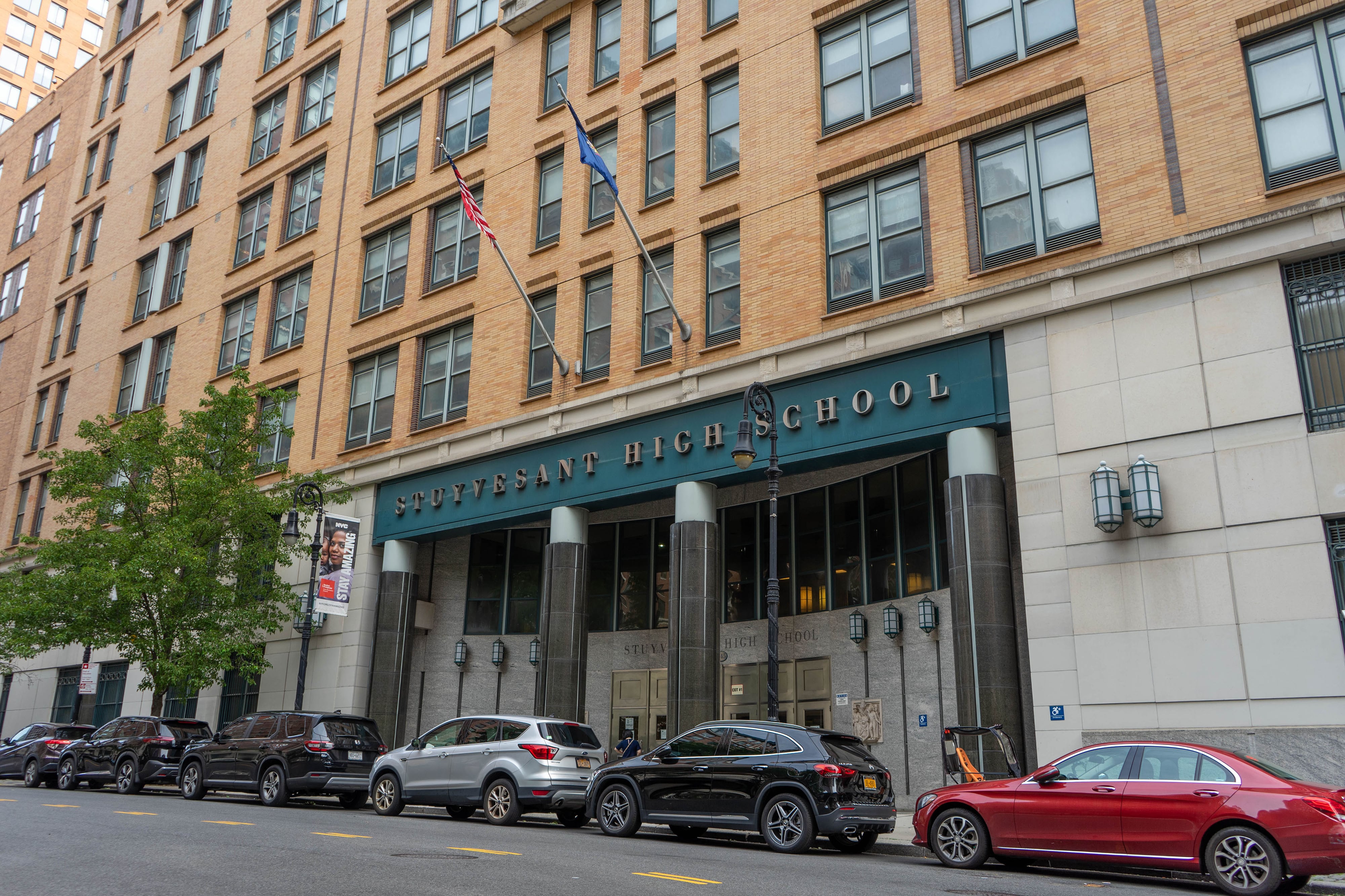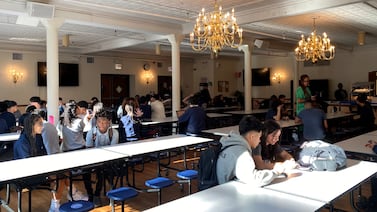Sign up for Chalkbeat New York’s free daily newsletter to keep up with NYC’s public schools.
This year’s eighth graders could be the last class that takes the Specialized High Schools Admissions Test with paper and pencil. A New York City education panel is slated to vote on a roughly $17 million contract later this month that would transition the test to a computer-based model.
Under the nearly six-year contract, the test-making company Pearson would create a computerized model of the Specialized High School Admissions Test, known as the SHSAT. The exam is the sole metric of admission to the city’s eight specialized high schools, including Stuyvesant and Bronx Science.
Though these schools represent just a fraction of the city’s students, they garner outsized attention given their status as some of the most prestigious public high schools in the nation. Last year, roughly 26,000 eighth graders took the SHSAT, and 4,072 were offered a seat.
If the contract is approved by the city’s Panel for Educational Policy, or PEP, later this month, Pearson would be tasked with developing and administering exams for five test cycles, beginning with the fall of 2025, according to city documents. The contract includes an optional two additional test cycles, which if enacted would bring the total cost to more than $23.5 million. (Pearson has developed paper versions of the exam for years.)
Jenna Lyle, a spokesperson for the city’s Education Department, said the proposal comes amid a broader shift toward digital education.
“Our students continue to live in a more digital world, both in and out of the classroom,” she said in a statement. “The transition to computer-based SHSAT testing is an extension of this shift. Our priority is always to ensure students have the resources and support they need, and the computer-based SHSAT will be no exception.”
Education Department officials noted many exams are now offered on computers — pointing to MAP tests administered twice a year for students in grades 2-8, as well as ongoing efforts to transition to digital SAT and Advanced Placement tests for high school students. The proposed contract also follows a statewide effort to phase in computer-based testing for New York’s 3-8 reading and math exams.
If passed, the shift would allow the SHSAT to adopt a computer-adaptive model, a form of computer-based testing that adapts the questions based on a student’s responses, according to the proposal.
But some worry that the move to a computerized model for the SHSAT could worsen inequities in an admissions process that already produces highly segregated outcomes. New York City’s specialized high schools have long faced criticism for admitting staggeringly low numbers of Black and Latino students.
During the last high school admissions cycle, offers to Black and Latino students at specialized high schools ticked up slightly, with 4.5% of offers going to Black students and 7.6% to Latino students, according to city data. But those figures remain well below the 65% of public school students who are Black or Latino.
“While kids today are certainly 21st century citizens, we know that there are major gaps in digital literacy and tech accessibility that tend to fall along socioeconomic lines,” said Jessamyn Lee, a Brooklyn parent and member of the PEP. Some students, for example, might only have access to a phone at home, she said. “It’s a very different experience than kids living in a household where there are computers everywhere.”
Some studies have found students in general tend to do worse on exams taken on a computer or tablet, though experts previously told Chalkbeat that research isn’t definitive.
Lee also questioned whether a computer-based test could pose further challenges to some students with disabilities, including those with visual impairments. The city’s specialized high schools admit few students with disabilities, with just 2% of students at the schools mandated to receive special education support, according to city data. Citywide, about 20% of students have disabilities.
Education Department officials said paper exams will remain an option for students with disabilities who have approved testing accommodations requiring them.
Concerns over timeline for switch to computer-based SHSAT
Edward Antoine, who runs the Brooklyn-based test prep company Antoine Education that offers tutoring for the SHSAT, said he believes students are often comfortable with digital testing environments — pointing to how many high schoolers embraced the new version of the SAT, which shifted to a computer-based model earlier this year. But he wondered how the content of the SHSAT might change to better fit a computerized model, noting, for example, that the College Board shortened reading passages when transitioning the SAT to a digital exam.
“I’m very curious to see if there’s actual changes in the content of what’s being tested, and what the format is going to look like, and how the interface is going to work,” he said. “But I don’t expect it’ll be difficult for kids to get acclimated.”
Still, Antoine said it’s critical that the city offers students access to practice exams that mimic the digital interface of the test well in advance of the new exam rolling out. Students should be able to start practicing a year in advance, he said.
“I don’t know when they’re planning on making it available, but it’s already late,” Antoine said.
Lee also raised concerns over the city awarding another contract to Pearson, as the national test-making company has faced controversy over high-profile missteps in New York and other states. In 2015, the state’s Education Department moved away from using Pearson for its standardized exams.
Pearson did not immediately respond to a request for comment.
Though the city’s Education Department began seeking vendors last fall for the shift to a computerized SHSAT, it received proposals from only two assessment companies — Pearson, and Educational Testing Services. An evaluation and advisory committee made up of Education Department officials determined Pearson offered “the lowest price while proposing superior services,” according to city documents.
Education Department officials said the panel of reviewers evaluating the proposals held expertise in assessment, enrollment, operations, technology, and academic content.
Pearson contract expected to pass as debate over SHSAT continues
Though Lee opposes the contract, she expected it to be approved by PEP members at the Oct. 30 meeting. Under the city’s mayoral control system, Mayor Eric Adams appoints a majority of members to the panel.
Gregory Faulkner, a former Adams appointee to the panel who was tapped to serve as its independent chair earlier this year, said he’s leaning against supporting the proposed contract — though he said he’s holding off on forming a firm opinion until after he’s briefed by the Education Department next week. He added that if a vote took place today, he suspected a majority of the panel would approve it.
“This is going to put a spotlight on the issue of testing,” he said. “I don’t think this is only going to be about us computerizing and updating. This is going to quickly move into the idea of testing and diversity in these schools — and I think that’s a good conversation to have, because clearly, these schools are not diverse.”
For years, integration advocates have clashed with supporters of the SHSAT over whether the city’s specialized high schools should continue to admit students based solely on a standardized exam. The issue falls outside the purview of city officials, with the SHSAT mandated under state law.
Former Mayor Bill de Blasio frequently sought to overturn that law, but failed to garner support in Albany. Adams and former schools Chancellor David Banks, who retired on Wednesday, have not made integration in selective schools a focus of their education agenda.
“Some panel members will feel frustrated, but they’ll feel we’ve got to go with state law,” Faulkner said of the upcoming contract vote. “My feeling is, okay if we have to do that, let’s get the DOE to commit to doing some things that make this pill a little bit easier for us.”
He hopes to see the city’s Education Department commit to more aggressive, free test preparation for students who can’t afford to hire outside SHSAT tutoring. He also questioned whether the date could be moved to allow schools more time to offer test preparation in the fall.
“I know of schools that do test prep for their students for free, but they begin it in September,” he said. “Whereas kids who have money begin their test prep in March.”
This year’s SHSAT will be offered at school on Oct. 30 for students attending the city’s middle and K-8 schools.
Eighth grade students who attend charter or private schools, who are home-schooled, or who attend a city school with grades 6-12, can take the exam on Nov. 16 or Nov. 17, while all ninth grade students can take the test on Dec. 6 or Dec. 7. For both sets of students, the exams will be offered at a central location listed on their test ticket, according to the Education Department’s website.
Students who wish to take this year’s exam must register by Oct. 18.
Michael Elsen-Rooney contributed.
Julian Shen-Berro is a reporter covering New York City. Contact him at jshen-berro@chalkbeat.org.






